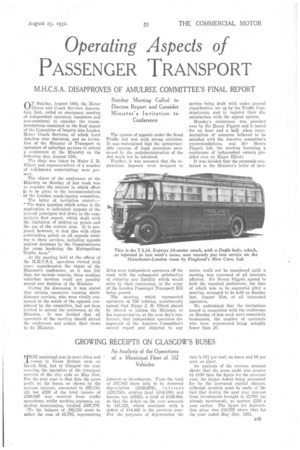Operating Aspects of PASSENGER TRANSPORT
Page 61

If you've noticed an error in this article please click here to report it so we can fix it.
M.H.C.S.A. DISAPPROVES OF AMULREE COMMITTEE'S FINAL REPORT
FIN Sunday, August 14th, the Motor IL/Hirers and Coach Services Association, Ltd., called an emergency meeting of independent operators (members and non-members) to consider the recommendations contained in the final report of the Committee of Inquiry into London Motor Coach Services, of which Lord Amuiree was chairman, and an invitation of the Minister of Transport to operators of suburban services to attend a conference at the Ministry on the following day, August 15th.
The chair was taken by Major J. B. Elliott and representatives of a number of well-known undertakings were present.
The object of the conference at the Ministry on Monday of last week was to consider the manner in which effect is to be given to the recommendations bf the London coach-inquiry committee.
The letter of invitation stated :— 4' The main question which arises is the application to individual appeals of the general principles laid down in the committee's first report, which dealt with the limitation of picking-up points and the use of the central area. It is proposed, however, to deal also with other outstanding points on all appeals relating to these services, including anneals against decisions by the Commissioners for areas bordering the Metropolitan Traffic Area." .
At the meeting held at the offices of the M.H.C.S.A. operators viewed with grave apprehension the object of the Minister's conference, as it was felt that, for various reasons, those working suburban services could not possibly accept any decision of the Minister.
Derins,the discussion it was stated that certain operators running shortdistance services, who were vitally concerned in the result of the appeals considered by the committee, had not been invited to attend the conference at the Ministry. It was decided that all operatnrs at the meeting should attend the conference and submit their views to the Minister. The system of appeals under the Road Traffic Act met with strong criticism. It was maintained that the unwarrantable expense of legal procedure occasioned by the maladministration of the Act could not be tolerated.
Further, it was assumed that the restrictions imposed were designed to drive most independent operators off the road, with the subsequent satisfaction of reducing any liability which would arise by their continuing, in the event of the London Passenger Transport Bill being passed.
The meeting, which represented operators of 550 vehicles, unanimously agreed that Major J. B. Elliott should be elected to inform the Minister, or his representative, at the next day's conference, that independent operators disapproved of the Arnulree Committee's second report and objected to any
service being dealt with under general classification set up by the Traffic Commissioners, and to register their dissatisfaction with the appeal system.
Monday's conference was presided over by Sir Henry Piggott and it lasted for an hour and a half, when representatives of concerns believed to be satisfied with the Amuiree committee's recommendations, and Sir Henry Piggott left, the meeting becoming a conference of independent owners presided over by Major Elliott.
tation could not be considered until a meeting was convened of all interests affected. Sir Henry Piggott agreed to hold the required conference, the date of which was to be suggested after a meeting, arranged to be held on Sunday last, August 21st, of all interested operators.
We understand that the invitations issued in connection with the conference on Monday of last week were completely inadequate, the number of operators who were represented being actually fewer than 20.




































































































